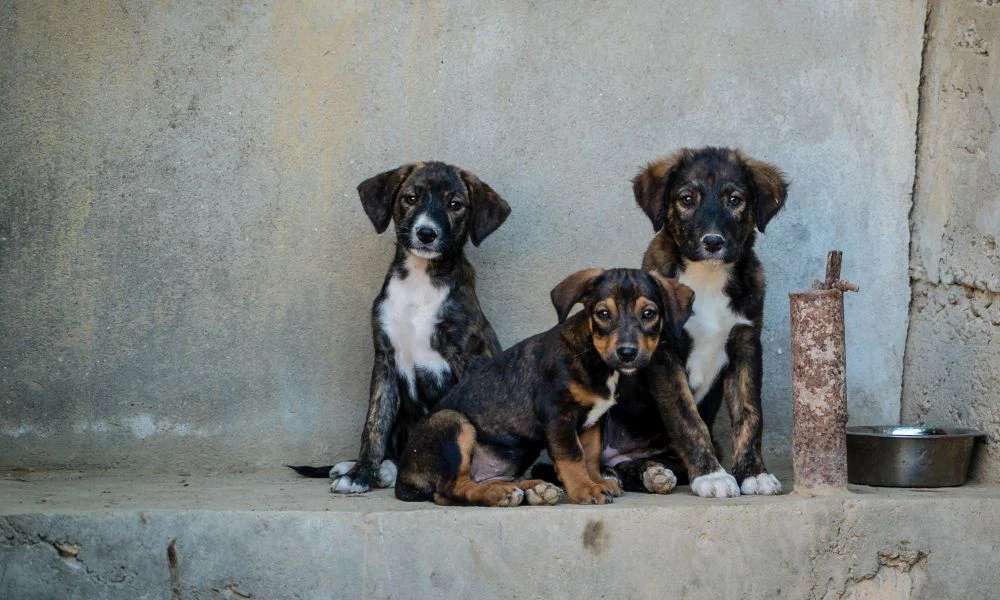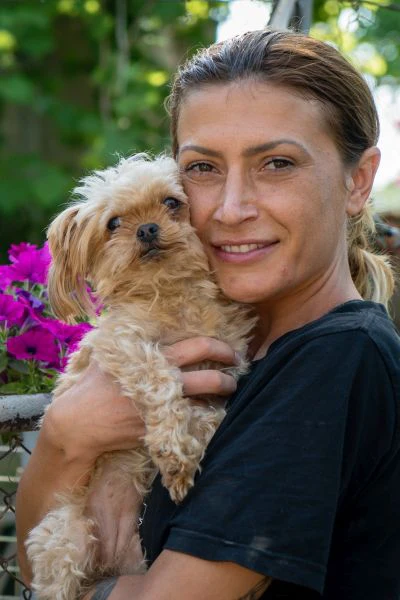Hilary Anderson’s charity, Barking Mad Dog Rescue, rescues abandoned pups in Romania and rehomes them in Britain and Germany. She tells Dudley & Co how she is planning for the future in the face of the great threat of our age: coronavirus.
Words by Elliot Wilson, Photography Hannah Kaplan
In 2013, Romania’s government announced a war on dogs. All strays were to be rounded up and killed.
Thousands of dogs died at the hands of brutal dogcatchers. But a few found homes in private shelters, and survived.
One of these was Pixie. Medium-sized with quiet, sad eyes, she lived in a park in the Romanian capital with her mother and brother and six other dogs. A local lady, unable to house her in public accommodation, fed her twice a day. She built a kennel for Pixie to live in during Bucharest’s harsh winters, but vandals smashed it to pieces.
Pixie’s life was transformed by the events of 2013. Life in the park wasn’t great, but nor was it terrible. Then the round-ups began. Safe from the dogcatchers but separated from her family, she hated life behind bars. Pixie stopped eating and started to waste away.
And that’s where Hilary Anderson comes in. When we catch up with each other on the phone, she’s in Wiltshire, deep in the English countryside, sheltering like the rest of us from the threat of coronavirus, in a home filled with dogs saved from shelters. (“It must drive the neighbours batty,” she remarks drily).

Doggies at Barking Mad Dog Rescue Centre in Romania
Then there is the amazing charity she founded four years ago in Romania, Barking Mad Dog Rescue, which saves abandoned local pups from death and disease, then re-homes them in Germany and Britain.
The journey to building Barking Mad started with one of those many single, small steps we all make every day. In Anderson’s case, it all began, she says, with “a share of a share of a share of a Facebook post”.
Someone in Bucharest was desperate to find a new home for a beautiful little dog slowly pining away in a shelter. It was Pixie. “I adopted her straight away,” she says. It was the look of lost-hope-on-furry-face that did it, and the countless horror tales of dogs beaten and killed at the hands of the dogcatchers.
Anderson says she was a helper from day one in life – she was simply born that way. “My mother would tell me ‘no more lame ducks’ when I was a teenager,” she says in her soft Scots brogue. “I always fought for the underdog and against injustice. If you have the capacity to help, you shouldn’t just look the other way. You need to act.”
Once Pixie was safe and warm in Scotland, Anderson and her partner Alex Shipp, an entrepreneur, took the next step. Unable to stop at rehoming just Pixie, she used social media to find new homes in Britain and Germany for Tiree, Lewis, Jura and Luca, four dogs scheduled to be put to death at a state-run kill shelter.


Dogs photographed at the Barking Mad Dog Rescue Centre
A trip to Bucharest revealed the plight of dogs in Pixie’s old home. The shelter was tiny and badly run. It was filled with malnourished dogs begging for attention and love. Many were rail-thin and suffered from ticks and fleas and other ailments.
Unable to turn her back on so many real-life underdogs, she started her own charity. Barking Mad Dog Rescue was born.
Capital challenge It wasn’t easy. Romania is a beautiful country where things move at a glacial pace. The country is still recovering from decades of Soviet misrule. Even the startling number of stray dogs – there is one for every 30 people – is a legacy of communism.
In the 1980s, the dictator Nicolae Ceaușescu bulldozed a large section of the capital, and resettled 40,000 people in the new suburbs. Many new high-rises didn’t allow dogs, so they were simply left to run wild in the streets. As communism crumbled, feral dogs ran wild in Bucharest, terrorising the streets at night.
At first, the money Anderson raised, most of it from Britons shocked at the plight of so many wretched dogs on Barking Mad’s Facebook page, funded the small shelter. “We did it properly from the outset,” she says. “There are so many bad dog charities out there, cons that swindle gullible people out of their money.”
The shelter’s problem was its owner, a well-meaning lady who couldn’t wrap her head around the logic and benefits of procedure. Simple things, like creating a separate veterinary audit trail for each new furry arrival.
Nor was the idea of doggie-style palliative care much understood. Many of the dogs came straight in from the streets. “The rescue is just the start,” says Anderson. “A dog needs medication, to be cared for, to be vaccinated and de-wormed. If you do that at the start, it eliminates so many problems down the road.”


Barking Mad Rescue dogs before being re-homed in England & Germany
She eventually handed the dogs to a Swedish charity to look after, and sunk her money and efforts into finding a local partner and a place to set up a shelter of her own. Again, social media came to her help; specifically, Facebook, where, to misquote the poet John Donne, no one is an island entire of itself, but a part of the main.
Gea, a bright young lady with faraway eyes and a desire to good, was the new partner. Nisipari, a tiny village hemmed in by barley fields, twenty miles from the Black Sea town of Constanta, was the place.
They got to work building two new shelters: one for healthy dogs, the other to house the older ones, puppies, and the sick. Gea spends her days prepping them to be homed with UK families. Every few months, a ‘transport’ of a dozen or so healthy pups leaves Romanian airspace, filled with wide eyes and great expectations.
She is helped by her father, a car mechanic who had just retired when Gea came to him with the idea of being Barking Mad’s local head of operations. “He’s a great guy,” says Anderson. “All he wanted was to fish and grow tomatoes on his allotment and have an easy life.” Instead he spends his time feeding dogs and being surrounded by furry love. And he loves it.


Rescue pups all waiting for new forever homes
It wasn’t easy – and it still isn’t. When the shelter was first built, hooligans tried to burn it down. And four years after launch, Barking Mad is still working its way through Romania’s labyrinthine bureaucracy, as it seeks to register as a local charity.
But it has won over locals, and worked its way into their hearts. Each year at Christmas, Santa Claus jumps on a sleigh and visits every home in Nisipari, delivering presents accompanied by a couple of the shelter’s cheerier and more placid dogs.
Three challenges lie ahead for Barking Mad and its founder.
The first is sustainability. Once the charity is locally registered, its owners can buy a plot of land – it currently rents property from a local farmer. The aim is to build a residential annexe that can house visitors from abroad.
“We have people over each year, who come to help out for a week or two, and who usually stay with locals,” Anderson says. It’s a form of ‘rescue tourism’, increasingly popular across North America and Europe.
And it goes beyond being a dog angel. Anderson is a member of a rewilding charity in Scotland, part of attempts to instil greater biodiversity in our countryside. She wants to foster that movement in Romania, a nation that has suffered terrible ecological damage over the past 30 years, in the face of a new era of industrial agrarianism.
The second challenge is structure. Anderson needs a kind of COO, a chief operating officer whose job it is to put the charity on a sound financial footing, to make sense of spending and plan for the future.
“Financially, it’s skin-of-the-teeth stuff’ for us,” she says. “We get a lot of donations, mainly online, and we are so grateful for all the help we get. And I have learned a huge amount about customs, operating licenses, how dog catching works. But I need a professional who can come and say, ‘have you thought of this or that’.
Finally, there is the elephant in the room – in every room in everyone’s house, everywhere: coronavirus.
Covid-19 has upended daily life, all but immediately and in so many ways. As of early April 2020, it is still getting worse in most places, but its long-term impacts will take months and perhaps years to be fully understood.
“No one knows what is going to happen,” Anderson says, with a soft sigh. “We need a plan, but of course no one can plan at this moment.” Barking Mad is flooded with requests from families across the UK and Germany keen to foster dogs – she reckons the number of applications quadrupled in the first three months of the year. The same is true for dog and other animal charities across the country and the continent.
The frustrating thing is – she can’t commit to any of them. Some of them are simply unsuitable, often because they are unsuitable or first-time foster families, but also because she can’t go to visit anyone.
“You can’t use Skype home-checks to evaluate a property or a family, so things have ground to a halt there,” she says. “We could probably empty our shelter in Romania in a week but 99% of the dogs would be back with us in a week and we just cannot do that to any of the dogs. It isn’t fair.”
Anderson has halted all transports from Romania, which is also on lockdown, and will keep that ban in place until the worst of the virus is past. “If we aren’t moving dogs on, we can’t take new dogs in,” she says. “Because of coronavirus, people are abandoning dogs in the fields.” For now, at least, there’s nothing she can do.
Donations are still flowing in, but coronavirus impacts everyone. It hits health but also financially security, and charities, like people and companies, will turn to the government for help. Barking Mad benefits from Britain’s Gift Aid tax relief, and it needs people to remember it, even when the skies above us are so dark.
But coronavirus will pass, and probably sooner than we realise. The world will return to normal, albeit a new normal, different from the one we left.
What is less certain, but which must be hoped, is that this amazing charity, which has found loving new homes for over 1,000 dogs in Britain and Germany, and which feeds 850 dogs on a daily basis, will still be here. And that its founder, an underdog for all seasons, will still be at the helm, driving it forward. If you can, donate. If you cannot, think of them and their dogs, cross your fingers, and hope.
Find Barking Mad Dog Rescue across social media
July 2022
July 2022